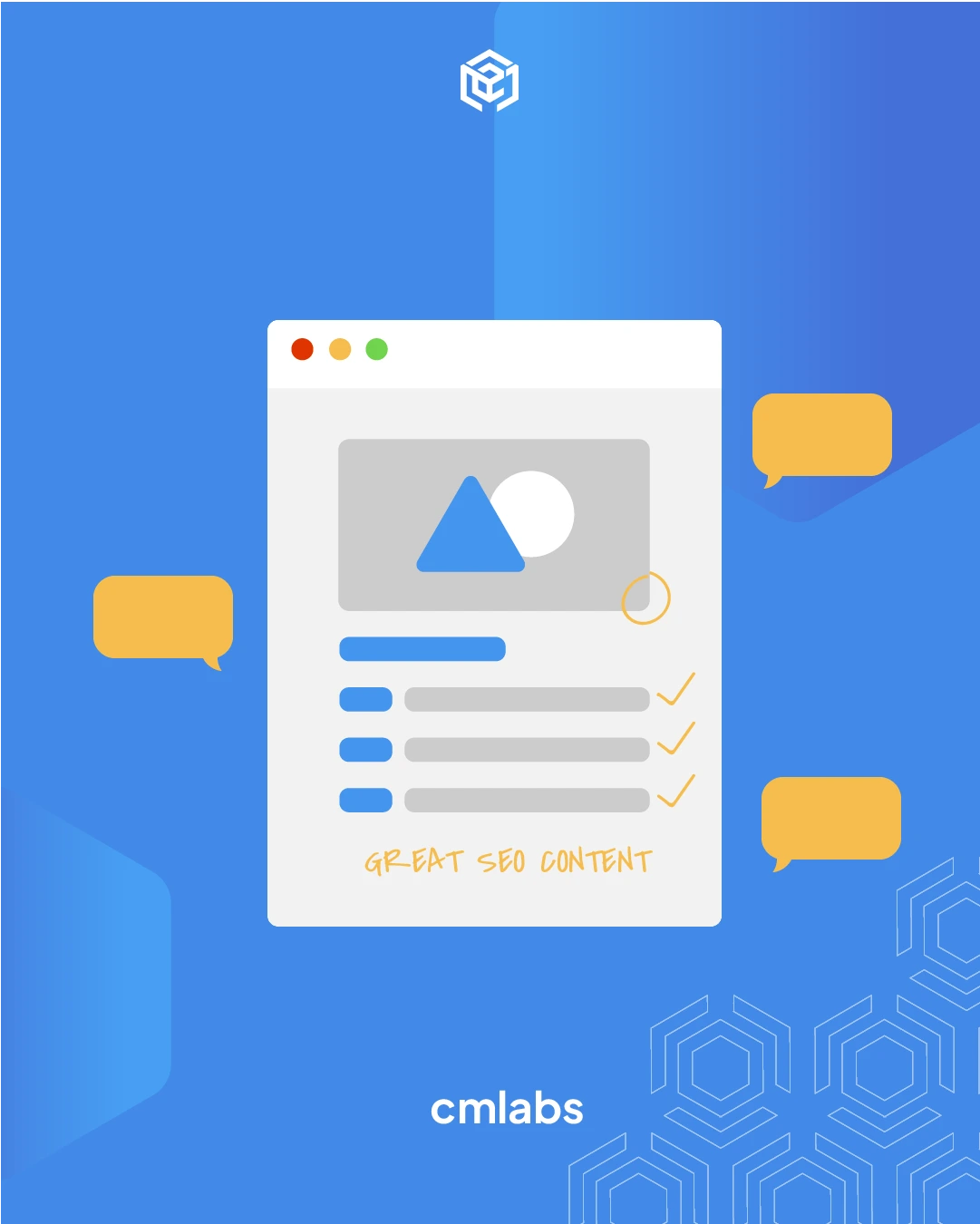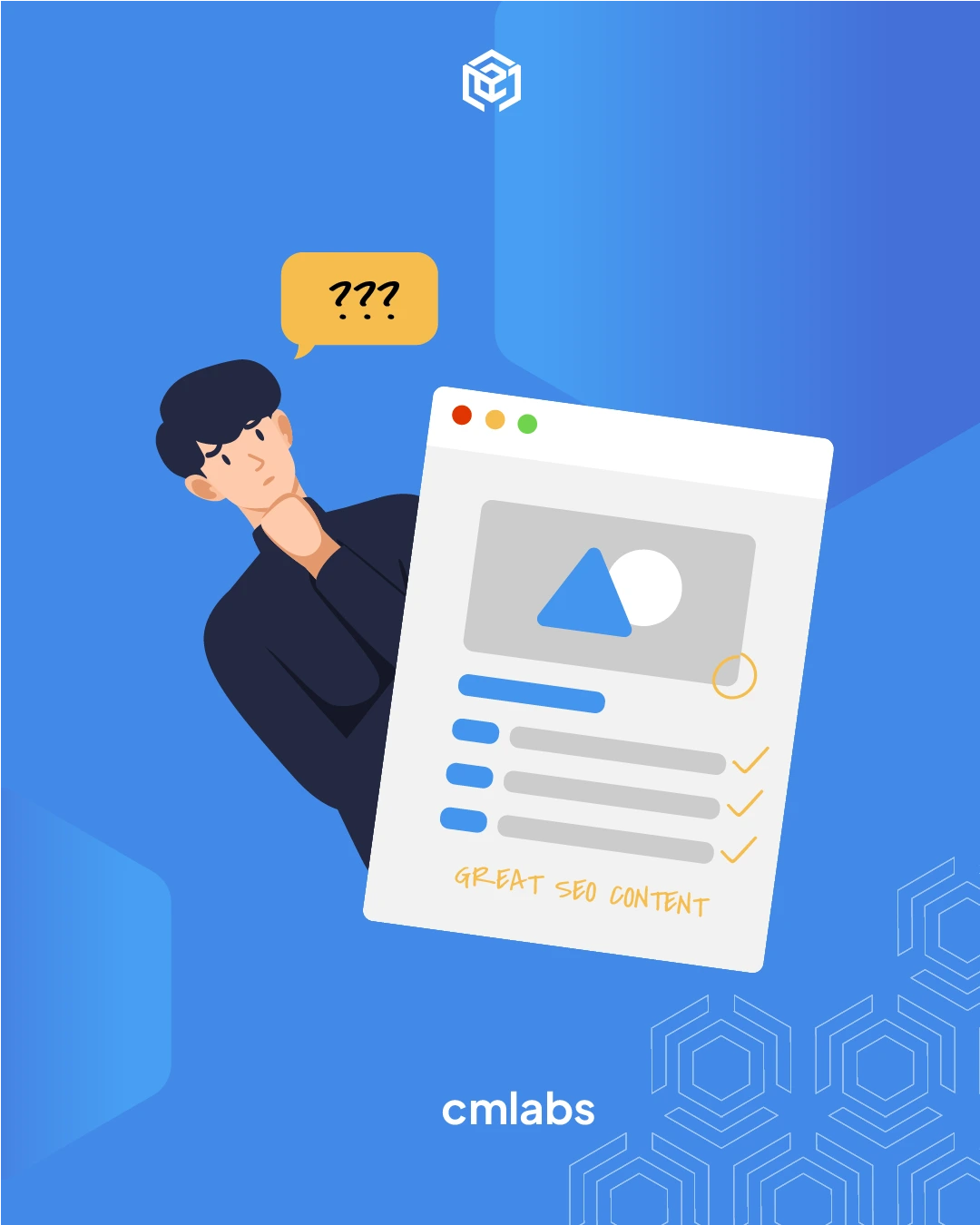We use cookies
This site uses cookies from cmlabs to deliver and enhance the quality of its services and to analyze traffic..
SEO SERVICES
Conduct in-depth technical website audits, strategically develop website projections, and increase your website authority.
ASO SERVICES
Elevate Your App’s Presence with Our Expert ASO Services – Boost Visibility and Drive Downloads!
WRITING SERVICES
We offer a variety of writing services to suit different business necessities. Reach broader audiences or lead specific industries? We've got you covered!
Get relevantly positive media exposure from bloggers and online publishers to increase your brand mentions on search engine results pages.
SEOlutions
A unified source of truth!
SEO & Digital Maternity Solution
SEO & Digital Maternity Solution: Leverage Cross-Platform Insights to Elevate Your Strategy with Expert Consultation
SEO & Digital Maternity Solution
Data Solution options:
Starting from Rp200 mio
Reinventing how a company get creative treatments
A new way to get your creative needs done. Agile team, efficient cost, and expedient way in a flexible yet scalable subscription plan!
Creative-as-a-Services
CaaS package options:
Based on Subscription
Pioneer in digital marketing software powerhouse
We’re excited to unveil our new range of Tech Solutions designed to drive your digital success. Whether you’re looking to enhance your website’s performance, streamline your tech stack, or unlock deeper insights from your data, we’ve got you covered.
Starting from Rp250 mio
Our Clients
Research and innovation center for digital transformation
Digital marketing combines technical skills and business knowledge at every stage. For marketing teams, improving budget management efficiency is crucial, as time is an invaluable resource that should be used wisely. At Sequence, we are dedicated to empowering you to optimize efficiency and strategic planning, ultimately enhancing the impact of your digital marketing efforts.
Subscription-based (IDR1,800/keyword)
Our Clients
BeyondSEO
References
SEO Tools for Webmasters
SEO Tools for Writers
SEO Tools
FIND THE SUITABLE PARTNERSHIP FOR YOUR COMPANY
Check out which cmlabs partnership program suits your company
WHITE LABEL SEO
for CorporateYour company is granted exclusive partnership rights to provide SEO services to our important clients, and we will provide a dedicated backend team to support your efforts.
AFFILIATE PROGRAM
for BizdevA new affiliate program is being introduced for skilled marketers and individuals with strong networks, offering commissions of up to 7% for generating profits independently.
DIGITAL AGENCY
for Marketing Partnerscmlabs is an essential partner for digital agencies, providing a unique selling proposition in Search Engine Optimization (SEO).
BACKLINK PARTNERSHIP
for Media / BloggerWe have a vast database of bloggers and media outlets across Indonesia, categorized by region and media type, giving our clients an edge in managing their media and SEO activities.
OFFICIAL TRAINING
We provide ongoing professional development and support to SEO professionals to ensure they are equipped to meet market demands.
JOIN AS CONTRIBUTOR
for Content WriterGreat opportunity for SEO Writers around the world. T&C applied!
ACADEMIC PARTNERSHIP
Through partnerships with universities in Indonesia, cmlabs has helped align academic curricula with industry demands.
Partnership
Sector & Industries
Tell us your SEO needs, our marketing team will help you find the best solution
As an alternative, you can schedule a conference call with our team
Schedule a Meeting?Contact
Survey
We use cookies
This site uses cookies from cmlabs to deliver and enhance the quality of its services and to analyze traffic..
Last updated: Sep 22, 2022
Keywords for SEO are the strings of words used by users to find information about a particular topic on search engines. When a user enters a keyword on the search page, the search engine will display various websites with pages containing that keyword.
In conducting searches, users use various types of keywords. There are users who enter keywords with only one word count, there are those who enter keywords with the aim of wanting to make a purchase, and so on.
These types of keywords depend on word length, audience, time of day, and search intent.
The use of a keyword for SEO will play an important role in the website's improvement. If a website wants to appear in the SERP for a certain topic, then you must determine the target keywords for the related topic.
By determining target keywords, you can display your website to an audience that matches the niche of your website or business.
Here are some types of keywords that you need to know:
Types of keywords for SEO based on the number of words are divided into two, namely short-tail keywords and long-tail keywords. Short-tail keywords are keywords with only 1-3 words. Long-tail keywords are keywords with a word count of more than 3. What is the difference between the two and when is the right time to use each type of keyword?
Short-tail keywords:
Long-tail keywords:
Keywords are also divided based on the time period. There are keywords that have increased searches at certain times or seasonally. There are also keywords that are suddenly much sought after, but after some time, their popularity decreases. The types of these two keywords are trend keywords.
Unlike before, there are types of keywords that are continuously searched by users. These keywords are referred to as "evergreen" keywords. If you want to get organic traffic growth for the long term, then your focus should be on targeting evergreen keywords.
However, if you want to follow trends and get a significant increase in traffic even in a short time, you can use a trending keyword for SEO.
You can also divide the types of keywords for SEO based on the audience. There are two types of keywords based on the audience, namely general keywords and specific keywords. To determine the use of this type of keyword, you must first identify the target audience through the buyer persona.
If your audience is the general public or beginners who don't have much knowledge about a particular topic, use general keywords. These keywords use general terms that are widely used by the community and are beginner-friendly.
While special keywords are keywords with uncommon terms and are only understood by people who have knowledge of the topic,
The last two types of keywords are based on search intent and user intent. Every user must have an intention or purpose when searching for a keyword. It could be because you want to answer a problem, get inspiration, clear doubts, or make a purchase. The types of keywords based on their user intent are as follows:
WDYT, you like my article?
Couldn't find result for "Mulki" try to search with different keyword
Suggestion:
Tell us your SEO needs, our marketing team will help you find the best solution
As an alternative, you can schedule a conference call with our team
Schedule a Meeting?



cmlabs Jakarta Jl. Pluit Kencana Raya No.63, Pluit, Penjaringan, Jakarta Utara, DKI Jakarta, 14450, Indonesia
(+62) 21-666-04470These strategic alliances allow us to offer our clients a wider range of SEO innovative solutions and exceptional service.

Psst! Hey there, SEO Stats and Tools SEO company! If you've ever planned of conquering the Indonesia market, you've come to the right place!